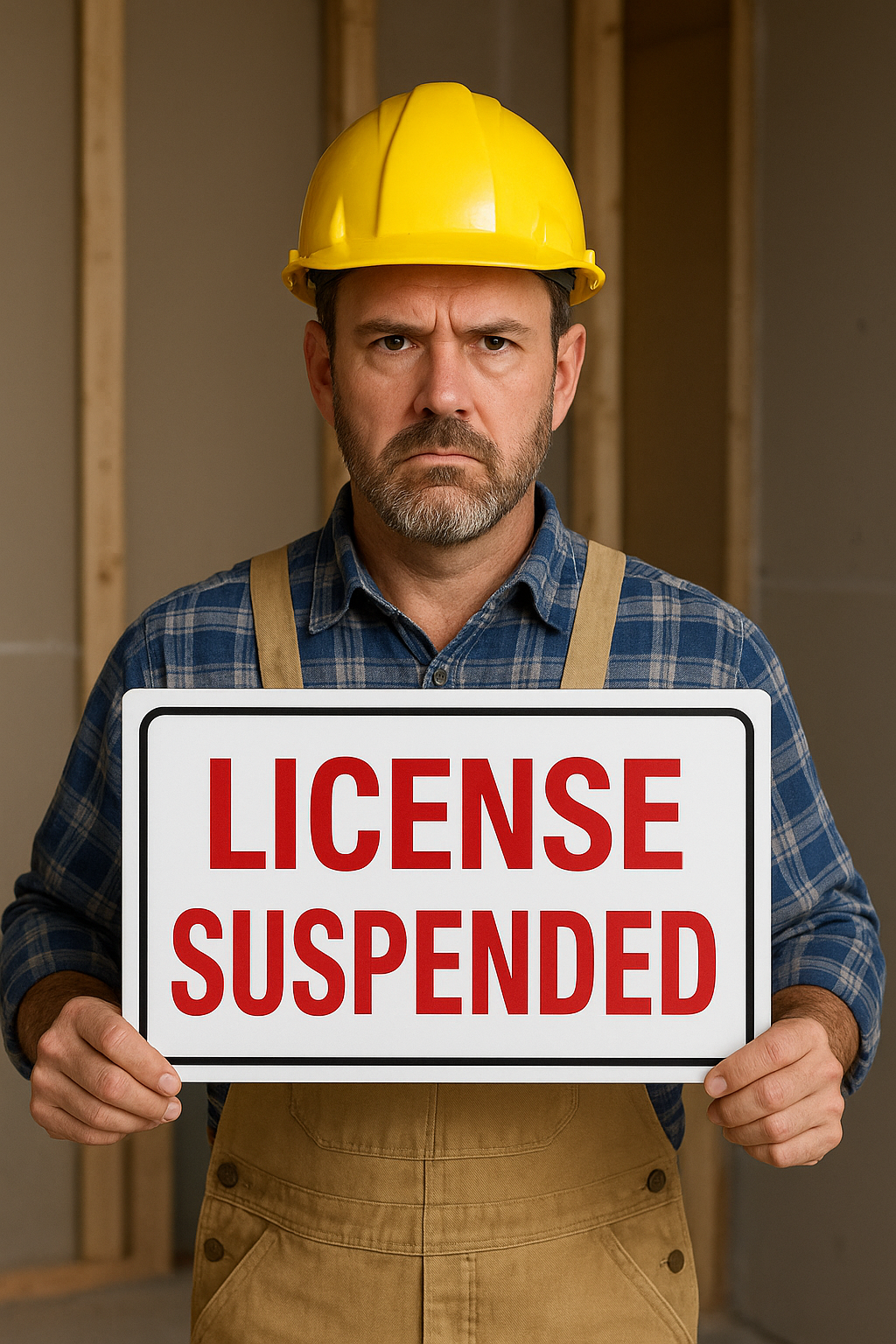As a contractor in California, your license is more than just a piece of paper—it’s the foundation of your business’s legitimacy and financial security. Yet, every year, countless contractors face license suspensions, often due to something as preventable as lapsed insurance coverage. At The Contractors Resource Center, we specialize in helping contractors like you maintain the proper insurance to keep your operations running smoothly. In this post, we’ll dive into why working with a suspended license is a massive risk, focusing on the concept of disgorgement—a legal remedy that could wipe out your earnings from a job, even if the work is done perfectly. Our goal? To educate you on these pitfalls so you can avoid them and protect your hard-earned revenue.
What Happens When Your Contractor License Gets Suspended?
License suspensions aren’t rare in the construction industry. They can stem from various issues, but one of the most common culprits is failing to maintain required insurance, such as workers’ compensation or general liability coverage. Under California law, enforced by the Contractors State License Board (CSLB), your license must be active and in good standing at all times while performing work. If it’s suspended—even temporarily—you’re effectively operating as an unlicensed contractor.
This isn’t just a minor hiccup. California Business and Professions Code § 7031(a) makes it clear: any contract you enter into or work you perform while your license is suspended is considered void and unenforceable. That means homeowners or clients can legally refuse to pay you for the services rendered during that period. Worse yet, if they’ve already paid, they have the right to sue for a full refund through disgorgement.
Understanding Disgorgement: The Ultimate Financial Penalty
Disgorgement is a powerful tool in the hands of dissatisfied clients, and it’s designed to deter unlicensed or improperly licensed work. In simple terms, it’s a court-ordered repayment of all compensation received for a project performed while your license was suspended. Yes, you read that right—all of it. Even if the job was completed on time, under budget, and to the client’s initial satisfaction, they can still pursue disgorgement if they discover your license status.
Here’s how it plays out:
- Legal Basis: Courts in California strictly enforce licensing laws to protect consumers. If your license is suspended (e.g., for not renewing insurance), the contract becomes invalid. Homeowners can argue that you had no legal right to perform the work or collect payment.
- No Exceptions for Good Work: Quality doesn’t matter here. The law prioritizes compliance over craftsmanship. Clients can recover every penny paid, leaving you out of pocket for materials, labor, and time invested.
- Real-World Impact: Imagine finishing a $50,000 remodeling job only to have the homeowner refuse final payment or demand a refund of deposits. Add legal fees to defend against a disgorgement lawsuit, and the financial hit could be devastating. In severe cases, repeated violations might lead to CSLB fines, criminal charges (misdemeanors or even felonies), or permanent license revocation.
This isn’t hypothetical—California courts have upheld disgorgement in numerous cases, emphasizing that contractors must be “properly licensed at all times during the performance of the contract.” If your suspension was due to insurance lapses, it’s an avoidable mistake that could cost you jobs, reputation, and revenue.
The Insurance Connection: A Common Trigger for Suspensions
As an insurance agency dedicated to contractors, we’ve seen firsthand how insurance gaps lead to suspensions. California requires specific coverages like workers’ comp for employees and a surety bond, but life gets busy—policies expire, premiums slip, and suddenly your license is flagged by the CSLB.
Working without proper insurance doesn’t just suspend your license; it exposes you to additional risks:
- Personal Liability: If an accident happens on the job, you’re on the hook without coverage.
- Client Backlash: Savvy homeowners check licenses on the CSLB website (cslb.ca.gov). If they spot a suspension, they might report you, triggering investigations and disgorgement claims.
- Lost Opportunities: Suspended licenses mean you can’t bid on new projects, stalling your business growth.
The good news? Keeping your insurance active is straightforward and prevents these issues from arising.
How to Avoid Disgorgement and Keep Your License Active
Prevention is your best defense. Here’s actionable advice tailored for busy contractors:
- Monitor Your License Status Regularly: Use the CSLB’s online portal to check your license and associated insurance. Set calendar reminders for renewal dates.
- Prioritize Insurance Compliance: Partner with a trusted agency like ours to ensure your policies (workers’ comp, liability, bonds) are always current. We offer customized plans for contractors, with reminders and easy renewals to avoid lapses.
- Pause Work During Issues: If your license is at risk of suspension, stop all projects immediately. Resolve the problem (e.g., reinstate insurance) before resuming.
- Document Everything: Maintain records of your active license periods, contracts, and communications. This can help if disputes arise.
- Seek Legal Advice Early: If a suspension occurs, consult a construction law attorney to understand your options and minimize fallout.
By staying proactive, you not only avoid disgorgement but also build trust with clients, who value licensed, insured professionals.
Final Thoughts: Safeguard Your Business Today
Working with a suspended license might seem like a shortcut in a crunch, but the risks—especially disgorgement—far outweigh any short-term gains. As contractors, your expertise deserves fair compensation, but that starts with compliance. At [Your Insurance Agency Name], we’re here to help you navigate insurance requirements and keep your license active, so you can focus on what you do best: building and growing your business.
If you’re a California contractor worried about your coverage or facing a potential suspension, reach out to us today for a free consultation. Let’s ensure your next job is profitable and protected—contact us at 530.320.3617 or email: [email protected]
Disclaimer: This post is for educational purposes only and not legal advice. Consult a qualified attorney for specific situations.


